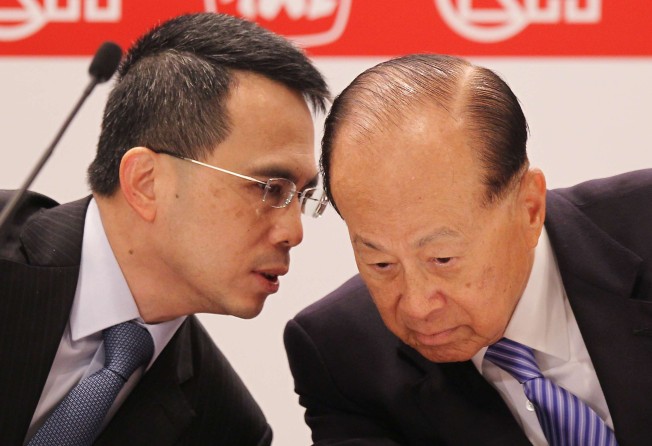Li Ka-shing’s utilities firms post lower annual profit on weaker pound, but still raises dividend pay out
Cheung Kong Infrastructure delivers net profit of HK$9.6bn (US$1.24bn), down from HK$11.2bn in 2015. Australian arm Power Assets sees 17pc fall

Cheung Kong Infrastructure (CKI), controlled by Hong Kong tycoon Li Ka-shing and which sources most of its profit from Britain, has reported a 14 per cent net profit decline for 2016 due to non-operating factors including lower tax credits and the weaker pound.
Net profit amounted to HK$9.6 billion (US$1.24 billion), down from HK$11.2 billion in 2015 – lower than the HK$10.6 billion average estimate of 12 analysts polled by Thomson Reuters.
If the impact of the pound’s depreciation is excluded, the profit contribution from Britain – which accounts for two-thirds of its income – rose 6 per cent to £603 million (US$746.7 million), CKI said.
If the impact of tax credits to reflect a cut in the UK’s corporate tax rate is also excluded, profit would have risen 14 per cent, it added.
“The uncertainty and volatility experienced in 2016 is expected to continue in 2017,” chairman Victor Li Tzar-kuoi – Li’s eldest son – said in a results filing to Hong Kong’s exchange after the market closed on Tuesday.
“For CKI, this may provide opportunities to expand. CKI is well-positioned to capture attractive opportunities in the markets and industries we currently operate in, as well as in new businesses or geographic areas which may arise.”
The uncertainty and volatility experienced in 2016 is expected to continue into 2017, said Victor Li, adding the impact of the weak pound from Britain’s plan to exit the European Union had been “negligible” impact on CKI’s profit, since its businesses’ returns tend to be “stable and predictable” and revenues are either regulated or supported by long-term contracts.
A final dividend of HK$1.63 per share was proposed, however, bringing the full-year pay out to HK$2.26, up from HK$2.15 for 2015.
In Australia, excluding a HK$781 million one-off profit from the sale of a minority stake in Australian unit Spark Infrastructure Group in June last year, pre-tax profit grew 1.1 per cent to HK$1.16 billion.
International utilities firm Power Assets, meanwhile, also controlled by CKI, on the same day announced a 17 per cent fall in net profit to HK$6.4 billion for last year, less than analysts’ average estimates of HK$7.55 billion.
Power Assets blamed the decline on the weaker pound, lower UK tax credits, and lower profit booked from its Hong Kong electricity unit after its stake was reduced to 33.4 per cent from 49.9 per cent.
The company has energy projects in Hong Kong, mainland China, Europe, Canada, Australia, and New Zealand. Britain contributed 69 per cent of its profit.
A final dividend of HK$2.02 per share was proposed, bringing the full-year total to HK$7.72 – inclusive of a HK$5 special dividend paid last month, up from HK$2.7 in 2015.
Ahead of the results, CKI shares closed 0.5 per cent lower at HK$62.5 on Tuesday while Power Assets ended down 0.2 per cent at HK$68.1, and Huaneng was flat at HK$5.75. The Hang Seng Index edged up 0.4 per cent.
● Separately, Huaneng Power International, the listed flagship of the nation’s largest power producer China Huaneng Group, unveiled a worse than expected 38 per cent decline for last year.
Net profit amounted to 8.5 billion yuan, down from 13.7 billion yuan in 2015, and was lower than the average 9.05 billion yuan estimate of 16 analysts polled by Thomson Reuters.
Profit was hurt by higher coal costs, a 2 per cent decline in power sales volume and a 10.5 per cent decrease in average selling price in mainland China.
The firm said it has booked 1.1 billion yuan of impairment on long-term assets due to low utilisation at some plants amid industry oversupply.
The average utilisation of Huaneng Power’s domestic power plants slid 5.4 per cent from 4,147 hours in 2015, as industry overcapacity worsened due to a plant construction binge that saw power supply exceeds demand growth in the past few years.
A final dividend of 0.29 yuan per share is proposed for last year, down from 0.47 yuan in 2015.
Revenue tumbled 12 per cent to 113.8 billion yuan from 2015.